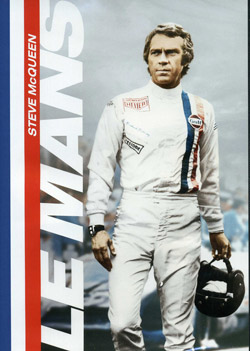|
Remastered May 2011 |
|
Joyce says... Normally when actors have chosen racing as a vehicle (pun intended) for a film, it’s been intended to enhance their star power. When Steve McQueen used his clout to make Le Mans it was to enhance his standing in the racing community. Indeed, they started the film without even an outline, much less a script, and there was no female lead cast for the first two months of filming. The original director quit because of McQueen’s interference and insistence upon racing accuracy. At one point, the entire crew went on strike, so what was to be McQueen’s triumph ended up being a bitter experience for him. But what emerged on screen is about as close to racing magic as has happened to date. Le Mans has a semi-documentary feel to it, with no dialogue between characters for the first 40 minutes of the film. It’s not missed. In fact, the “romance” could have been lost in favor of the far more compelling love-hate relationship between McQueen and his chief on-track rival, played convincingly by German actor Sigfried Rauch. In fact, the entire cast consists of Europeans unknown in America, but all doing yeoman work considering the stars of the film (besides McQueen) are a Ferrari 512 and a Porsche 917. The 917 actually won Le Mans, with some genuine racing filmed and included, but much of the “racing” was filmed a couple of months after the 1970 race, utilizing 45 of sports car racing’s biggest international stars along with stunt drivers. In fact, one stunt driver lost his leg in a film accident, and Derek Bell received minor burns when the car he was driving caught fire, so it was far from the usual fake stuff. To call Le Mans “eye candy” does it a disservice. But it is so lovingly crafted around the racing that it begs to be seen on the big screen. Since that’s not possible, high def and surround sound are required. This is one of the very few racing films that trusted the racing to carry the story line. There are no villains—only rivals. Even McQueen’s character is flawed—and (spoiler alert) doesn’t win the race, which is much more realistic since the vast majority of drivers never win The Big One. Add Le Mans to the short list of must-see racing films. Type of Racing: International sports cars Tracks: Le Mans, of course Reel Racers: Steve McQueen Real Racers: None featured, but many sports car stars stunt drove for the film. Year of Release: 1971 Remastered May 2011 DVD Length: 108 minutes Approx. On-Track: 46 minutes, but all have something to do with the race Color/B&W: Color Watch for: . . . A brilliant touch—eliminating all sound except an accelerating heartbeat prior to the race start. The literal explosion of engines starting is so much more effective. (But this was not the first time for this—it is done very briefly at the start of Grand Prix.) . . . One of the few inaccurate moments is the airborne Ferrari (after trying to avoid hitting a track marshal standing on the track) does not explode for several seconds but when it does the fireball is bigger than a 747 would make. The later Porsche wreck, however, is so well-crafted that you’re left wondering how the heck they filmed it without actually killing the driver. . . . No back boards, no immobilizing the injured driver. No firesuits in the pits, single-layer suits on the drivers. A very casual attitude toward safety on the track. A gendarme (policeman) stands right next to a guardrail as the cars roar by, and just a few moments later we see how many feet inward the rail gives when smacked by the race car. Tsk. Tsk. . . . McQueen says to the girl friend—a racing widow who ought to know—that racing is so important to him that “what goes before and after is just waiting.” . . . Maybe the most realistic dialogue of all between the driver McQueen replaces during the race, and his wife: “Does it really matter?” she asks, and he says, “Yes.” “But you were going to (retire today) anyway.” He turns his puppy dog eyes on her, “But not this way.” |
